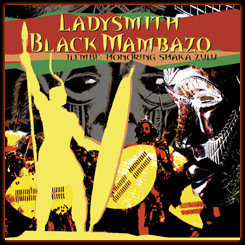

Ladysmith Black Mambazo became popular with Paul
Simon's album Graceland (1986). The song Homeless was often released
on numerous albums of this group. Ladysmith Black Mambazo (The black
axe from the town Ladysmith) was founded in 1964 by Joseph Shabala. He
is founder, writer, composer and the genius of the group. He is still
the spirit and leader of the group.
Ladysmith Black Mambazo pays with Ilembe tribute to the historical
icon Shaka Zulu, a warrior who united the Zulus with various
neighboring tribes into a single powerful force that helped give birth
to a proud nation. “He was a warrior, an athlete, a singer, a dancer,
a visionary, he was so many things,” says Joseph Shabalala, lead
singer and founder of Ladysmith Black Mambazo. “He was a diplomat too.
He could talk about differences in a civilized way, but he was also
very proud. If you said, ‘No, I’m not going to cooperate,’ then he
would say, ‘Alright, let us see who is the boss.’”
O Mmu Beno Mmu (Somebody and Somebody) is opening the album
Ilembe, set for worldwide CD and SACD release January 15, 2008 on
Heads Up International. The song prizes the solidarity of people
working together for a common intention.
Kuyafundw' Osizini (Ilembe) is honoring the legendary Shaka
Zulu and his gift to unite the tribes under one power. There is much
pride in the song about the heroic deeds of the ancient warrior.
Shabala comments: "Don’t worry about the many things that are in your
way. If you confront those obstacles and learn from them, you will
teach others how to conquer the same kinds of obstacles. There are
people who complain about everything, and they want to avoid doing
things that are too hard, like school or a job. Those people should
stay where they are and learn from their experiences."
Vela Nsizwa (“Show Yourself, Young Man”) is a song about
the chosen one who has to show that he is the right one for the woman
who has selected him. Lets Do It is a song about political
affairs. Like all other songs this one is an a capella piece
cultivating the group’s classic sound in their natural language.
Umon' Usuk' Esweni is a song against the dangers of jealousy.
“If you see something you want,” says Shabalala, “make sure you want
it for the right reasons. Something can be beautiful and alluring, but
not good for you.” Sizobalanda (“We Are Here”) is a one of
those songs with a religious content. The message: "We are here to
preach, and to encourage people to understand God and bring them home
to a place where they can love God.”
The second religious song is This Is the Way We Do. Shabala's
conclusion: "Many people have asked us how we have had so much
success. This is the way we do it. We put our songs together to
worship God. If there’s something you want from this life, you have to
ask God to help show you the way of how to do it. If you want to be
successful at anything, you can only do it with the help of God.”
The title Iphel' Emasini is a Zulu proverb that means,
‘There’s a beautiful thing in front of you, but there is a cockroach
on top of it.’ A cockroach is very easy to see when it’s standing in
something white. You can spoil something by concentrating too much on
the negative. Try to look past the bad things and focus on the good
things. Otherwise, you’ll be afraid to enjoy life.”
Asekhon' Amatshitshi (“The Virgins Are Still There”) reveals
Shabala's opinion about today's young woman. “The song praises and
encourages the young women who still take care of their virginity. So
many people in my country are convinced that the young women are
corrupt, and have no respect for their bodies. But I’m saying that
there are still many young women who are careful to protect their
virtue.”
Hlala Nami (“Stay With Me”)
talks about the value of staying with a
good person, whether it’s a wife or a husband or a friend – any person
from whom you can learn and do good things. You might have a friend
whom you stay with for a while, but then you grow tired of him and you
run away, and then you get into trouble. That friend will say, ‘Hey,
come back to me. Stay with me. We did good things together.”
Prince of Peace is a song about Jesus. Shabala compares him
with the warrior Shaka Zulu: "The spear that Jesus used was the truth.
He told people how to live in peace, even when some people in his time
didn’t want to hear that message.”
The last song Iphel' Emasini (Nature Effects) is another
version of the cockroach song with some special vocal effects.
Most of us don't understand the Zulu language and
the content of the individual songs. But we understand the language of
music, harmony and melody. Everybody who loves a capella pieces will
enjoy the GRAMMY®
Award winning vocal group Ladysmith Black
Mambazo's new album.
